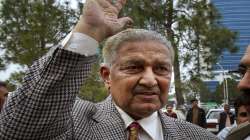Pakistani nuclear scientist Abdul Qadeer Khan dies at 85
Abdul Qadeer Khan's health condition started deteriorating on Saturday night, after which he was rushed to the Khan Research Laboratories Hospital in Islamabad, according to his family members.

Pakistani nuclear scientist Abdul Qadeer Khan, who is the founder of Pakistani nuclear programme, passed away due to lung problems on Sunday at the age of 85, his family said.
Khan's health condition started deteriorating on Saturday night, after which he was rushed to the Khan Research Laboratories Hospital in Islamabad, according to his family members, Xinhua news agency reported.
Earlier in August, the nuclear scientist was admitted to the same hospital after testing positive for Covid-19. He had been moved back home after being successfully treated for the coronavirus disease, according to government officials.
Pakistani Prime Minister Imran Khan expressed his condolences to the family of the nuclear scientist, saying on Twitter that he was loved by the nation because of "his critical contribution in making Pakistan a nuclear weapon state".
"For the people of Pakistan he was a national icon," the prime minister said.
Pakistani President Arif Alvi said in a tweet that the nuclear scientist has helped Pakistan "develop nation-saving nuclear deterrence, and a grateful nation will never forget his services in this regard".
In a 2018 book "Pakistan's Nuclear Bomb: A Story of Defiance, Deterrence And Deviance", Pakistani-American scholar and academic Hassan Abbas has highlighted Khan's involvement in nuclear proliferation in Iran, Libya and North Korea.
He wrote that the origins and evolution of the Khan network were tied to the domestic and international political motivations underlying Pakistan's nuclear weapons project.
The writer also examined the role of China and Saudi Arabia in supporting its nuclear infrastructure. Khan is reported to have intimate links with China’s nuclear establishment.
The US State Department said in 2009 that Khan had run an "extensive international network for the proliferation of nuclear equipment and know-how that provided 'one stop shopping' for countries seeking to develop nuclear weapons."
According to the State Department, this network's actions had "irrevocably changed the proliferation landscape and have had lasting implications for international security."
According to an article dated January 31, 2018 published in the Foreign Policy magazine, "Outside of Pakistan, Khan has largely been forgotten, despite the fact that his fingerprints are all over the world’s most volatile nuclear hot spots”.
"Indeed, three of the United States' most significant national security challenges -- Iran, North Korea and Pakistan -- are largely the results of Khan's handiwork," the American magazine said. It said that the damage Khan did remains.
"Driven by ego, nationalism and a skill for subterfuge, Khan built a clandestine global network that increased the danger of a nuclear catastrophe.
Worse, he was never forced to identify the participants in his black market,” it said.
"Khan may eventually be relegated to the dustbin of history. But the lessons learned from his crimes must be addressed before it’s too late,” the article added.
(With inputs from PTI, IANS)
ALSO READ | Pakistan hospitals run out of beds on dengue surge
ALSO READ | Pakistan's economic crisis gift of past rulers? Minister Fawad Chaudhry claims so